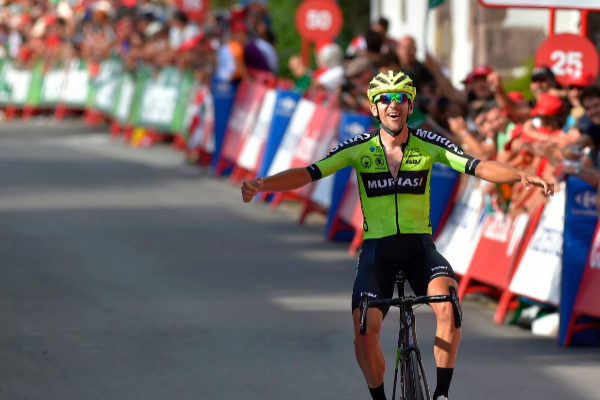- Classifications: so is the general
- Leader: Strange alliances to overthrow Roglic
From that day on the operating table of the Saint-Junien hospital to this one in Dantxarinea, just two years have passed. Two years in which the impossible has ended up becoming reality. Mikel Iturria , with a double femur fracture, came to think that he could never compete on a bicycle again, a threat of a 25-year-old mowed race. That it was going to end suddenly in the Tour of Limousin, a modest career in the middle of France, without reaching a single dream of youth. [Narration] [General classification]
But cycling, despite its cruelty, is sometimes generous and benevolent, sometimes it more than compensates for all the suffering suffered in almost anonymous tests, in which the reward, when there is one, is always small and never well valued. Iturria, who had never won as a professional, goes and does it in La Vuelta, after a 24-kilometer solo fight against much more successful runners and a lot better a priori than him.
Iturria cries because he does not believe it, although he still does not seem aware of what he has achieved. And the whole Euskadi-Murias cries with him, because Jon Odriozola and his people feel the same, that the suffering is worth it. That arriving every year in September without knowing if the project will go ahead or decline without remedy is a hard toll that deserves to be paid if the reward is so great, as it was in La Vuelta of 2018 with the victory of Óscar Rodríguez in La Camperona.
"We have achieved impossible things in these four years, I have won even me," proclaims Iturria, still in tears, emptied by the most pleasant effort of his life. And he remembers that day when he decided to approach Dantxarinea to explore the stage and then underline it in his career plan. "Here I want to win," he said to himself, because the stage had it all, the predictable white card of the platoon (he reached more than 18 minutes), the proximity to his house in Urnieta , just over 50 kilometers from the which is already the goal of his life, and the bucolic landscapes of the Baztán Valley that surround success with cellophane.
The dream dream
It was, in short, the victory dreamed by Iturria and Murias, with an unusual tension that covered her with an added layer of epic. The Gipuzkoan was part of the escape of the day, consisting of 14 runners, some of high level such as Gorka Izagirre , Aranburu , Craddock and Cavagna . A getaway that collaborated without hostility until the first two opened fire in Ispéguy, the most important point of the day, still 60 kilometers away.
From then on, in a path full of steep, the attacks and regrouping followed. At 24 kilometers of goal, the key moment arrived. Iturria, who had taken off, reached the head group in the company of Arcas, Benjamin Thomas and Cavagna and did not think about it. Instead of slowing down and catching air, he grabbed the handlebars tightly and left alone. The rest, thinking that he was not a too dangerous runner, let him do. Error. They only saw him at the finish line.
Well, better written, they saw him when two kilometers were missing. At one point, Howson and Ghebreigzabhier came to have him just 200 meters away. It was then that Iturria opened the sky. The last kilometer and a half was in continuous descent and in that terrain he managed to maintain the advantage until crossing the finish line alone and without stress, achieving a memorable victory, the fourth of the Spanish cycling in this Tour after those of Madrazo, Herrada and Valverde .
According to the criteria of The Trust Project
Know more- sports
- cycling
- Back to Spain
Tour of Spain The Tour will be a springboard
Tour of Spain Why is Miguel Ángel López 'Superman'?
Tour of Spain Nairo Quintana's most unexpected victory: "I think I had never won like this"

